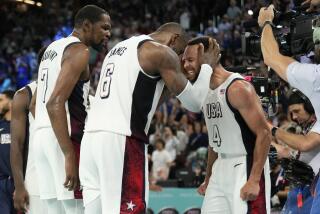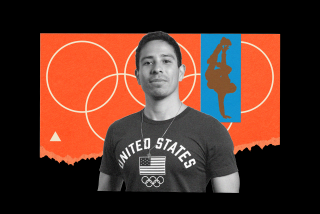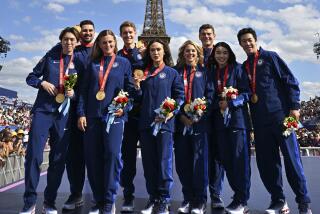Americans grab bronze rings
- Share via
BEIJING -- Coming from nowhere, with its two top gymnasts injured, and with an inconsistent replacement who hadn’t made the original team coming through at the best possible moment, the United States won an unlikely bronze medal in the Olympic men’s gymnastics team competition Tuesday at National Indoor Stadium.
China destroyed the field as expected, winning the gold medal with 286.125 points. Japan overtook the U.S. on the last rotation to win the silver with 278.875.
But even after Kevin Tan had a sit-down moment on the pommel horse and Raj Bhavsar so slowly rotated that it seemed as if time stood still, Alexander Artemev came out for the second time in a row to fiercely swing around the horse, flying high and landing with satisfaction.
The Americans had to wait while Germany also finished on the pommel horse. The Germans had needed to score at least 45.900 points to tie the U.S. but Phillip Boy, Robert Juckel and Thomas Andergassen managed only 44.650. The U.S. had its bronze with 275.850. The Germans hugged the Americans in a teary moment for both the medalists and the fourth-place finishers.
The Chinese placed first on five of the six apparatuses. It was sweet redemption for the team that finished fifth in Athens.
This bronze medal, in its way, was equally redemptive for the Americans.
After stars Paul and Morgan Hamm withdrew within 10 days of each other and the team added alternates Bhavsar and Artemev there were questions about whether the team would advance into the eight-team final.
But Artemev, who had fallen three times on the pommel horse during four rounds of Olympic qualifying, came through with his nerves bundled up and put away.
When he completed his horse routine, Artemev howled, and jumped into the arms of his teammates.
Even though the U.S. finished with its two worst scores (on floor exercise and pommel horse) it had built a cushion.
On the first routine of the morning, Chen Yibing, 23, an Olympic rookie, finished his final floor pass by staggering out of bounds and slapping his hands to his head. His score of 14.575 brought a collective groan in the arena.
The Chinese men four years ago were heavy favorites to defend the team gold medal they had won in Sydney in 2000 but a series of major falls in the team finals landed them in fifth. Japan won the team gold and the United States, led by the Hamms, won the silver.
After Chen’s inauspicious start, though, Yang Wei and another youngster, Zou Kai, 20, powered through their floor tumbling with tightly wound somersaults and flips. Yang had a solid 15.425 and Zou an excellent 15.925 and as Takuya Nakase stumbled badly to lead off on floor for Japan, it seemed a Chinese rout might be on.
This Chinese team is filled with veterans. Leader Yang, 28, is a three-time Olympian who won team gold and individual all-around silver in 2000; Xiao Qin, and Li Xiaopeng (who won team gold and individual gold on parallel bars in 2000 and a parallel bronze in 2004); have Olympic experience.
The Americans started on still rings, where Bhavsar did a steady turn and scored 15.325.
It was on the third rotation for China, the rings, that the team began to pull well ahead.
Huang, Yang and Chen scored over 16.000 and the arena erupted. Chinese flags waved and even for those who don’t speak Mandarin the chant was clear. “Let’s go . . . China. . . . Let’s go . . . China.” Chen’s 16.575 was the final score posted and the team high-fived and acknowledged the crowd.
The American fans began tentatively making themselves heard with a “USA, USA” chant after Bhavsar (15.575) and Jonathan Horton (15.625) knocked out solid parallel bar routines. When Justin Spring finished the set with a 15.850, the U.S. led the competition. China took the lead after vault.
Those “USA” cheers got even louder when Joey Hagerty, Horton and Spring flew through the high bar without a fall. Horton and Spring, who do high-risk moves, had taken big falls during qualifying competitions but when Spring held his landing the men jumped into each others’ arms. Assistant Coach Miles Avery swung Spring around.
After four rotations the U.S. was second, 1.575 points behind China and over three points ahead of third-place Japan. But the U.S. finished with its two weakest events, floor exercise and pommel horse.
--
More to Read
Go beyond the scoreboard
Get the latest on L.A.'s teams in the daily Sports Report newsletter.
You may occasionally receive promotional content from the Los Angeles Times.






